Affiliate Disclosure: This article contains affiliate links, which means I may earn a commission if you purchase through my links. This comes at no extra cost to you and helps keep 99signals running.
Search is changing faster than most SEO teams can keep up. Traditional keyword rankings and organic SERPs are no longer the full picture. Google’s AI Overviews, ChatGPT Search, Perplexity, and Gemini are all reshaping how answers are presented. The battle for visibility has shifted from ranking on page one to being cited inside AI-generated responses.
Think back to the rise of mobile SEO in 2015. Brands that ignored mobile-first optimization were left behind when Google rolled out “mobile-friendly” updates. The AI shift today is just as transformative, maybe even more so. If your brand is not showing up inside AI-powered answers, you are invisible to a growing share of search traffic.
This is exactly the problem
- Does my brand show up in Google AI answers?
- How is my brand being described across ChatGPT, Perplexity, and Gemini?
- Which competitors dominate AI share of voice?
- Which prompts am I missing, and how can I close those gaps?
To go beyond theory, I tested the AI Visibility Toolkit on my own blog, 99signals, and the insights were eye-opening. Below, I’ll walk you through the toolkit’s features, what it revealed about 99signals’ presence in AI search, and most importantly, what marketers can do with this data.
Check out the
Table of Contents
- Key Features of the Semrush AI Visibility Toolkit
- What the Semrush AI Visibility Toolkit Revealed About 99signals
- Semrush AI Visibility Toolkit Pricing
- Who Should Use the Semrush AI Visibility Toolkit
- Final Verdict: Future-Proof Your SEO Strategy
- Semrush AI Visibility Toolkit FAQs
- What is the Semrush AI Visibility Toolkit?
- 2. How much does the Semrush AI Visibility Toolkit cost?
- 3. Is the Semrush AI Visibility Toolkit worth it?
- 4. Does the Semrush AI Visibility Toolkit replace traditional SEO tools?
- 5. How is the Semrush AI Visibility Toolkit different from ChatGPT or other AI tools?
- 6. Who should use the Semrush AI Visibility Toolkit?
Key Features of the Semrush AI Visibility Toolkit
Semrush divides the toolkit into four big buckets. On the surface these may seem simple, but each opens up entirely new dimensions of SEO analysis.
1. Visibility Overview
The Visibility Overview shows your AI Visibility Score and breaks down how often your brand is mentioned or missing across AI-generated answers. Think of it as the AI equivalent of rank tracking.
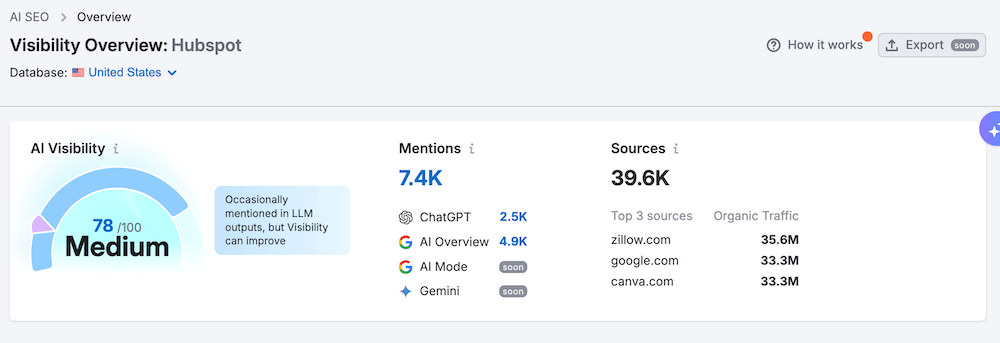
Instead of keywords, the unit of analysis is prompts. For each query tested across platforms, you can see whether your brand is included, absent, or incorrectly cited.
Why it matters: Visibility in AI answers is the next big distribution channel. When Google’s AI Overviews surface, the links shown are far fewer than the classic 10 organic results. If you are not included, you simply do not exist for those users.
2. Brand Performance
Brand Performance goes a layer deeper by analyzing how AI platforms describe your brand. It focuses on three key areas:
- Sentiment: Are mentions favorable, neutral, or negative?
- Attributes: What qualities and descriptors does AI consistently attach to your brand?
- Competitor Comparisons: How your mentions stack up against others in your category.
The charts in this section highlight both share of voice and the tone of those mentions. For example, you can see if competitors dominate volume but with lower sentiment, or if your brand earns fewer mentions but with stronger positive associations.
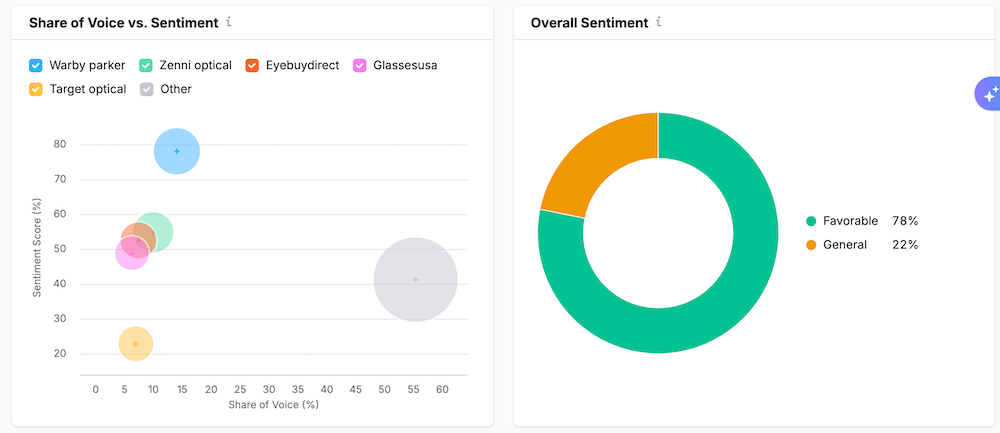
This matters because AI-generated descriptions increasingly shape perception. If ChatGPT or Google’s AI Overview frames your product as “outdated” or “overpriced”, that narrative can spread faster than traditional reviews or media coverage. Monitoring this gives you a chance to spot red flags early and actively shape the story.
3. Prompt Tracking
Prompt Tracking lets you select specific prompts that matter for your business and monitor them daily.
For example, a CRM company might track “best CRM for startups” or “[brand] vs HubSpot.” An agency might track “top SEO companies in [city].”
Instead of manually testing these in ChatGPT every week, you get a trendline that shows how often you appear, which competitors dominate, and whether changes you’ve made have moved the needle.
4. AI Crawlability Checks (Site Audit)
The
- Missing schema markup (FAQ, HowTo, Product)
- Poor internal linking
- Outdated content
- Non-descriptive anchor text
Think of this as the technical SEO foundation for AI visibility. You can have great content, but if it is not structured in a way AI can parse, it will never surface in answers.
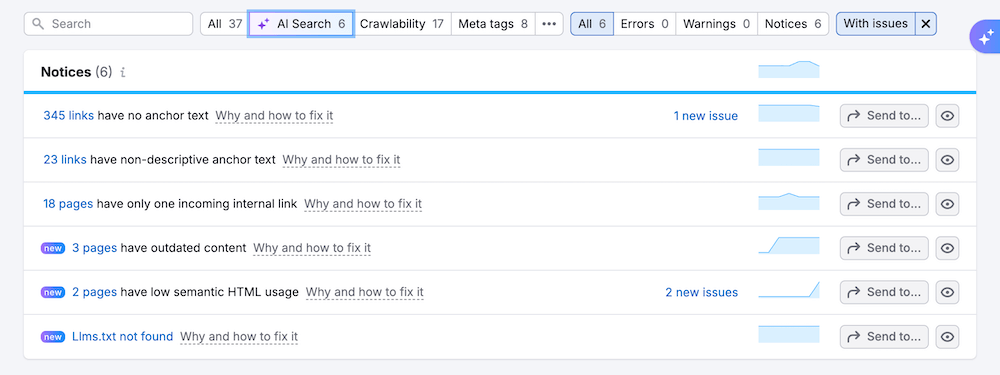
What the Semrush AI Visibility Toolkit Revealed About 99signals
Now let’s get into the real-world insights. Running the AI Visibility Toolkit on 99signals.com revealed both strengths and blind spots. These are the types of findings you can expect when applying the tool to your own site.
1. AI Strategic Opportunities
The toolkit flagged three mid-term priorities for 99signals:
- Close the Google AI Snapshot Gap: Competitors like HubSpot,
Semrush , and Moz dominate AI Overviews. 99signals currently has no visibility. - Audit Outdated Content: Many AI responses reference old statistics and screenshots, which erodes trust.
- Expand Multimedia Resources: AI increasingly pulls from video and audio. 99signals’ podcast (Marketing Mantra) and YouTube content are underleveraged.
Key Takeaway: This was a wake-up call. My site has strong organic rankings for review-driven keywords, but AI Overviews completely skipped 99signals in favor of larger brands. The action plan here is clear: update old posts with fresh stats, add structured FAQ blocks, and diversify into video explainers that AI can embed or cite.
The Brand Performance report benchmarked 99signals against HubSpot,
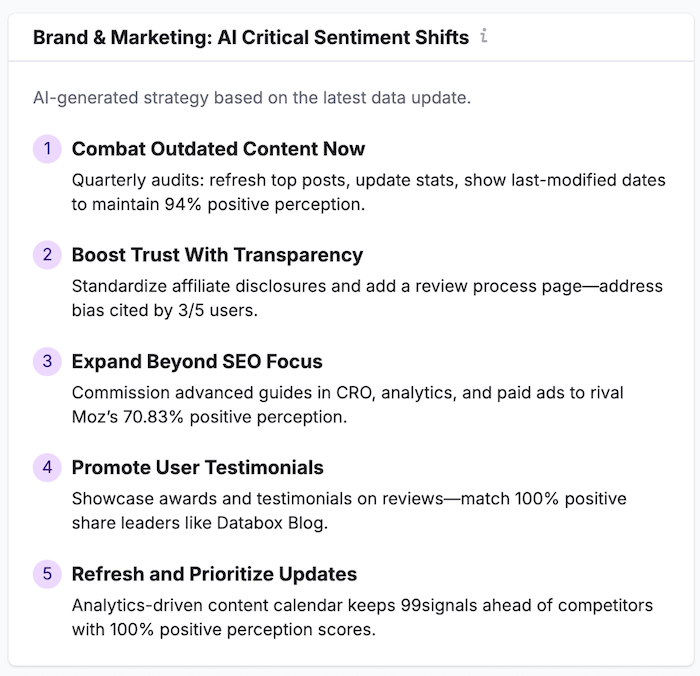
- Positive perception: 94 percent of mentions were favorable.
- Top strengths: “Actionable step-by-step guidance,” “In-depth tool reviews,” and “Trustworthiness.”
- Weaknesses: Outdated content, limited coverage outside SEO tools, occasional perception of affiliate bias.
Key Takeaway: For marketers, this is invaluable. AI is essentially building a brand profile based on how content is presented and cited across the web. For me, it confirmed that while 99signals has a reputation for trust and depth, the perception of being narrowly focused and sometimes outdated is real. That is a clear content strategy gap: expand into adjacent topics like Generative SEO (GEO) and AI in Marketing, and update evergreen guides more frequently.
3. Citations & Sources
The
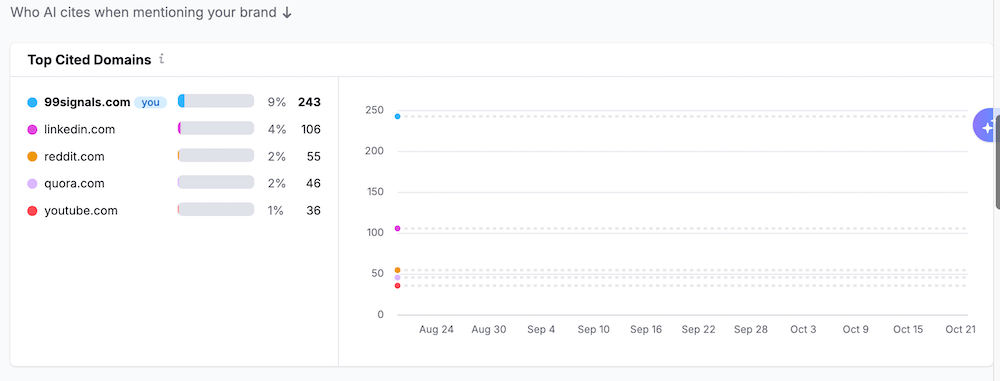
Top cited domains included:
- 99signals.com (243 citations)
- LinkedIn (106)
- Reddit (55)
- Quora (46)
- YouTube (36)
Key Takeaway: AI often cites third-party sources like LinkedIn, Reddit, and Quora instead of the original site. While it is positive that 99signals is mentioned frequently, it is troubling that AI sometimes relies on community discussions instead of my own content. The fix is twofold: strengthen internal authority with structured summaries, and lean into external authority by optimizing LinkedIn long-form posts and repurposing Quora answers.
Inside Google AI Mode, HubSpot holds 17.89 percent share of voice, while 99signals barely registers. Moz,
Key Takeaway: This underscored the need for comparison content and structured “best of” guides that AI can easily extract. HubSpot dominates because it publishes research-backed reports, maintains strong entity-level authority, and invests in multimedia. For a niche site like 99signals, the path forward is to carve out narrower niches where I can own the conversation and supplement that with original research.
5. AI-Generated Strategic Recommendations
The
- Dominate Tool Comparison Queries: Launch a hub covering 25+ software comparisons.
- Repurpose Podcasts for Social SERPs: Clip podcast content into YouTube Shorts and LinkedIn carousels.
- Revamp Toolkits: Convert static PDFs into interactive web assets.
- Publish Original Research: Commission surveys and release data reports to strengthen authority.
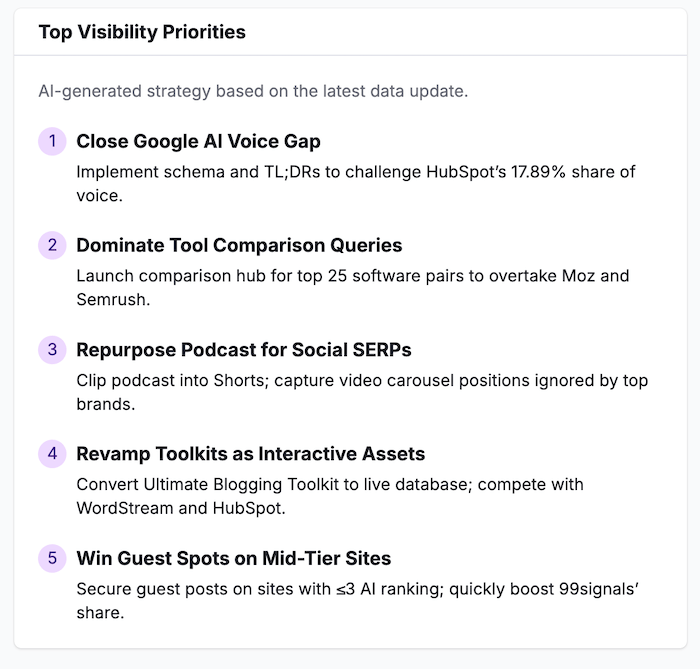
Key Takeaway: As you can see, these are not generic “write more content” tips. They were tied directly to my brand’s current blind spots in AI search. The strongest theme: AI rewards content that is structured, multimedia, and backed by data.
Semrush AI Visibility Toolkit Pricing
The
What you get at $99/month:
- AI visibility reports for any domain (300 reports per day)
- Ability to track 25 custom prompts (daily AI rankings)
- 1 domain for Brand Performance analysis
- Mentions from ChatGPT, Google AI, Gemini, and Perplexity
- AI competitor analysis and prompt research
- Site audit for AI readiness
Guru/Business heads-up:
If you’re a Semrush Guru user (or subscribed to the Business plan), your Prompt Tracking limit increases to 50 prompts per LLM. This upgrade applies to the prompt cap only, not to pricing for extra domains.
There is no free trial for the AI Visibility Toolkit, but you can explore free demo reports for Visibility Overview and Brand Performance to understand the workflow before you subscribe.
Explore Semrush AI Visibility Toolkit (Demo Reports Available)
Who Should Use the Semrush AI Visibility Toolkit
The
- Bloggers & Solopreneurs: Track how your site appears in AI-generated answers, identify gaps, and protect your traffic.
- SEO Agencies: Provide clients with competitive AI visibility dashboards and hard data to prove ROI.
- In-House SEO Leads: Benchmark your brand’s performance against major competitors and stay ahead of shifts in search.
- Founders & CMOs: Monitor how AI surfaces your brand at scale, and connect insights directly to strategy.
If your business model depends on organic visibility, ignoring AI search today is like ignoring mobile SEO in 2015. You’ll lose ground while competitors adapt.
Final Verdict: Future-Proof Your SEO Strategy
The
- Where your brand is winning (and losing) in AI search.
- How AI platforms describe you.
- Which competitors dominate, and why.
- Action plans to fix gaps.
From my own 99signals test, the toolkit surfaced blind spots (no presence in Google AI Mode), strengths (high trust score), and next steps (structured data, multimedia expansion, updated content).
If you want to future-proof your SEO in the AI era, this toolkit is worth the $99/month investment.
Try Semrush AI Visibility Toolkit ($99/month, cancel anytime)
Semrush AI Visibility Toolkit FAQs
What is the Semrush AI Visibility Toolkit?
The
2. How much does the Semrush AI Visibility Toolkit cost?
The toolkit is available for $99/month as an add-on. If you already have a Guru or Business plan, you get more tracking capacity included.
3. Is the Semrush AI Visibility Toolkit worth it?
It depends on your needs. If you’re already using
4. Does the Semrush AI Visibility Toolkit replace traditional SEO tools?
No. It builds on
5. How is the Semrush AI Visibility Toolkit different from ChatGPT or other AI tools?
The key difference is integration with real SEO data. While ChatGPT can generate text,
6. Who should use the Semrush AI Visibility Toolkit?
It’s best suited for agencies, content marketers, and serious bloggers who need consistent visibility tracking and want to optimize content at scale.
Related Articles

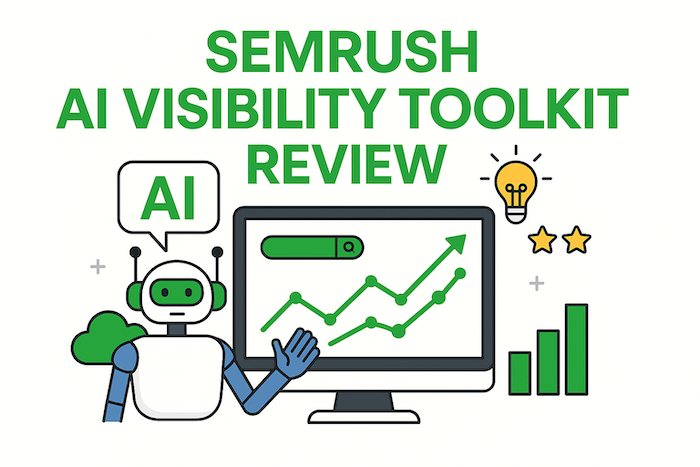
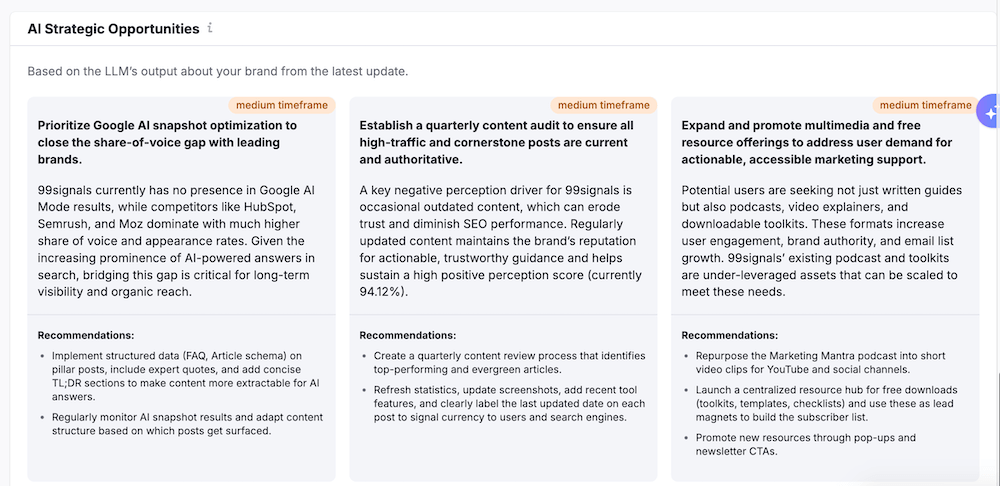
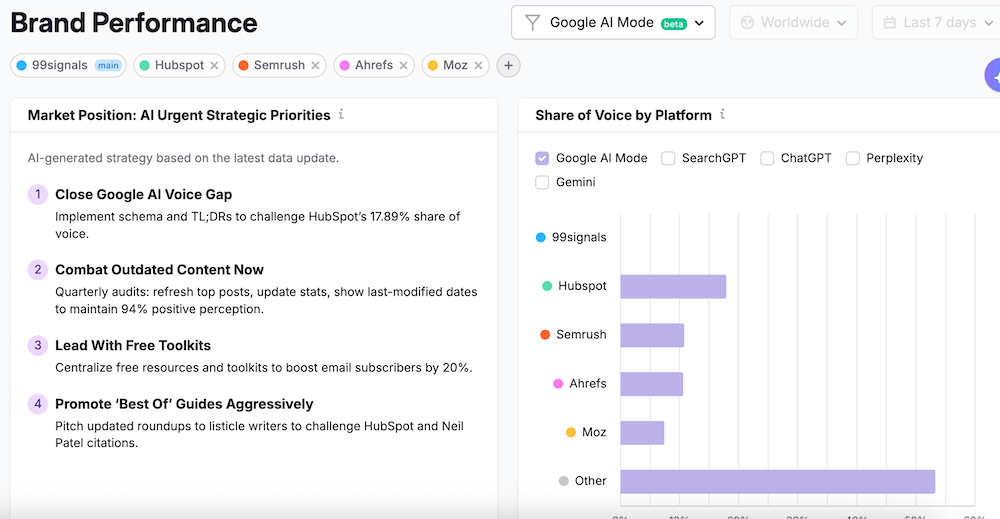
[…] to use: ChatGPT and Perplexity Pro for prompt testing, Semrush AI SEO Toolkit to benchmark AI […]
Literally all of the ‘AI Optimisation’ suggestions here are the same SEO advice that has been standard practice for the past decade.
It’s the same basic thing that happened with the voice search ‘revolution.’ The method of asking is slightly different, but the information required and how to structure it is exactly the same.
I’m not sure that a monthly $90 payment for that info is worth it to anyone. Kind of highlights why the AI bubble is about to go ‘pop’.